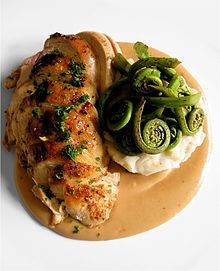The term supreme (also spelled suprême)[1] used in cooking and culinary arts refers to the best part of the food. For poultry, game and fish dishes, supreme denotes a fillet.[2][3][4]

Chicken
editIn professional cookery, the term "chicken supreme" (French: suprême de volaille) is used to describe a boneless, skin-on breast of chicken.[2][3] If the humerus bone of the wing remains attached, the cut is called "chicken cutlet" (côtelette de volaille).[2] The same cut is used for duck (suprême de canard) and other birds.
Chicken supremes can be prepared in many ways.[2] For example, supremes à la Maréchale are treated à l'anglaise ("English-style"), i.e. coated with eggs and breadcrumbs, and sautéed.[5] A supreme can be minced, resulting in such dishes as suprême de volaille Pojarski.[5] There are also various versions with stuffing. A popular variety is suprême de volaille à la Kiev, commonly known as chicken Kiev, for which chicken supremes are stuffed with butter.[6]
Fruit
editTo supreme a citrus fruit is to remove the skin, pith, membranes, and seeds, and to separate its segments.[7][8] Used as a noun, a supreme can be a wedge of citrus fruit prepared in this way.
Sauce
editSuprême sauce (sauce suprême) is a rich white sauce[9] made of chicken stock and cream.[1][10] This sauce is often served with chicken dishes.[1]
The term "supreme" is also used for a dish dressed with a suprême sauce (e.g. a suprême of barracuda).
Other cooking uses
editSupreme can also be used as a term in cookery in the following ways:
See also
editReferences
edit- ^ a b c Chambers 21st Century Dictionary. Allied Publishers. 1996. p. 1421. ISBN 9788184243291.
- ^ a b c d Auguste Escoffier (1907). A Guide to Modern Cookery. London: W. Heinemann. p. 507.
- ^ a b H. L. Cracknell; R. J. Kaufmann (1999), Practical Professional Cookery, Cengage Learning EMEA, p. 409, ISBN 978-1-86152-873-5
- ^ Edward Renold; David Foskett; John Fuller (2012), Chef's Compendium of Professional Recipes, Routledge, p. 135, ISBN 978-1-13607-861-3
- ^ a b Auguste Escoffier (1907). A Guide to Modern Cookery. London: W. Heinemann. p. 512.
- ^ * Leto, Mario Jack; Bode, Willi Karl Heinrich (2006). The Larder Chef. Routledge. p. 130. ISBN 978-0-75066-899-6.
- ^ Wignall, Judita (May 2011). Going Raw. Quarry Books. p. 72. ISBN 9781592536856.
- ^ American Cookery. 1922. p. 249.
- ^ Meyer, Adolphe (1903). The Post-graduate Cookery Book. Caterer Publishing Company. p. 59.
- ^ Owen, Catherine (December 2007). Choice Cookery. Applewood Books. pp. 23–24. ISBN 9781429011471. Retrieved 11 October 2014.